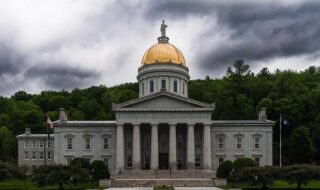February 7, 2025
PUC estimates 58 cent per gallon hike under “Clean Heat”
On January 15, 2025, the Vermont Public Utilities Commission (PUC) published its final report on potential implementation of a Clean Heat Standard. The PUC found the mandate would increase the cost of heating fuels (natural gas, propane, heating oil) by 8 cents per gallon in the first year (2026) and 58 cents per gallon in the tenth year (2035).
Read the full Clean Heat Standard Report here: VT PUC: SECOND CHECKBACK REPORT on the CLEAN HEAT STANDARD.
The VT PUC’s report is the final step in a two year process that started with the passage of Act 18 in 2023, which directed the PUC to develop an implementation plan for the Clean Heat Standard.
Notably, the PUC found the value of CHS greenhouse gas reductions would be $477 million while the program-related costs are estimated at $956 million. And the program costs do not include the the share of the cost of an “improvement” homeowner or business, just the revenue raised and redistributed through the program.
Ultimately, the PUC concluded that the program is too complex to administer and advises replacing it with a simpler per gallon tax to fund emissions reductions projects.
What’s the Clean Heat Standard?
In a nutshell, the Clean Heat Standard aims to reduce greenhouse gas emissions from heating sources on a graduated scale that aligns with the Vermont Global Warming Solutions Act. In other words, GHG emissions from heating would need to decline 40% below 1990 levels by 2030 and 80% below 1990 levels by 2050.
The standard proposes to accomplish this by establishing a credit market where fossil-based heating fuel wholesalers and dealers reduce the carbon intensity of heating fuels, fund improvements like energy efficiency or fuel switching projects, or purchase credits to offset the fuel emissions. While biofuels and experimental renewable natural gas could play a role in the early years of the program, the ultimate goal is to replace fossil fuels with electricity as the energy source for heating.
As noted above, the cost of the improvements far exceeds the benefits from the associated GHG reduction.
The Real Costs of “Clean Heat”
The PUC modeled three different “price impact scenarios,” with the projected price increases roughly the same for residential propane and heating oil. In year one, the per gallon price increase ranges from 8 cents to 9 cents. In year ten, the range is 56 cents to 65 cents. The projected increase for natural gas is a bit higher: 9 to 10 cents in year one and 78 to 88 cents in year 10.
Source: VT PUC
It is likely that per gallon prices will continue to rise after year 10, though the PUC analysis is limited to the first ten years of the program.
Detailed modeling of the price impact for commercial and industrial customers is also not available in the report. One concern this raises for small businesses is that “hard-to-decarbonize” agricultural, manufacturing, or other industrial processes that rely on propane, natural gas or oil may be forced to pay even higher fuel prices as supply and delivery costs get spread among fewer and fewer customers.
Other observers have noted that the PUC report may not fully capture the cost of the Clean Heat program, as it does not include a full cost analysis for building out a complex credit market management system and other administrative costs associated with standing up and running the program.
Those gaps explain some of the difference between the PUC’s current modeled price and previous per gallon price increases estimated by the Clean Heat bill author and others. Those estimates ranged from $1.70 per gallon to $4 per gallon.
Where Do We Go Now?
There are some differences in opinion about what happens now that the final report is out, but the PUC makes clear that further action from Vermont legislators is necessary to fully implement the program (while the fuel dealer registration and other requirements remain in effect either way).
Governor Phil Scott continues to oppose the mandate. Even before the report came out, Republicans in the Vermont General Assembly had introduced a full repeal of the Clean Heat Standard, led by Rep. Jim Harrison (Chittenden): Bill Status H.16.
The bill was referred to the nine-member House Energy and Digital Infrastructure Committee, of which five members appear fairly committed to the Clean Heat Standard.
See the committee roster here: House Committee on Energy and Digital Infrastructure.
In the background looms taxpayer-funded lawsuits encouraged under the Global Warming Solutions Act to enforce its carbon reduction standards, which could be used to try and force the state’s hand.
NFIB is a member-driven organization advocating on behalf of small and independent businesses nationwide.
Related Articles














